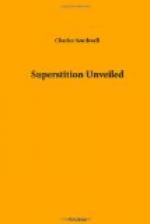A universe of nothing was more to his taste than a universe of dust, and he accordingly amused himself with the ‘spiritual’ work of imagining one, and called its builder ‘God.’
The somewhat ungentle ‘Shepherd’ cordially sympathises with Dr. Young in his detestation of the Materialist’s universe of dust, and is sorely puzzled to know how mere dust contrives to move without the assistance of ‘an immaterial power between the particles;’ as if he supposed anything could be between everything—or nothing be able to move something. Verily this gentleman is as clever a hand at ’darkening counsel by words without knowledge’ as the cleverest of those he rates so soundly.
The names of Newton and Clarke are held in great esteem by all who are familiar with the history of mechanical and metaphysical philosophy. As a man of science, there is no individual, ancient, or modern, who would not suffer by comparison with Sir Isaac Newton; while common consent has assigned to Dr. Samuel Clarke the first place among religious metaphysicians. It would be difficult, if not impossible, to cite any other Theists of better approved reputation than these two, and therefore we introduce them to the reader’s notice in this place; for as they ranked among the most philosophic of Theists, it might be expected that their conceptions of Deity, would be clear, satisfactory, and definite.—Let us see, then, in their own writings, what those conceptions were.
Newton conceived God to be one and the same for ever, and everywhere, not only by his own virtue or energy, but also in virtue of his substance.—Again, ’All things are contained in him and move in him, but without reciprocal action’ (sed sine muta passione) God feels nothing from the movements of bodies; nor do they experience any resistance from his universal presence. [33:1]
Pause, reader, and demand of yourself whether such a conception of Deity is either clear, satisfactory, or definite,—God is one. Very good—but one what? From the information, ’He is the same for ever and everywhere,’ we conclude that Newton thought him a Being. Here, however, matter stops the way; for the idea of Being is in all of us inseparably associated with the idea of substance. When told that God is an ’Immense Being,’ without parts, and consequently unsubstantial, we try to think of such a Being; but in vain. Reason puts itself in a quandary, the moment it labours to realise an idea of absolute nothingness; yet marvellous to relate, Newton did distinctly declare his Deity ’totally destitute of body,’ and urged that fact as a reason why He cannot be either seen, touched, or understood, and also as a reason why he ought not to be adored under any corporeal figure!




